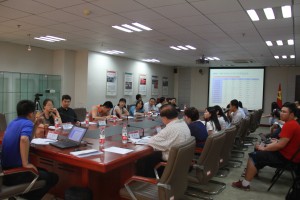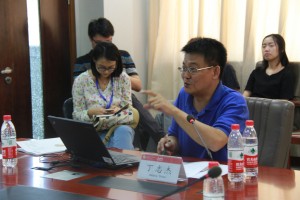Macro-Finance Salon (No. 34): International Monetary System Reform and SDR
2016-06-19 IMI Prof. Ding Zhijie analyzed the international net savings and investment yields in the last decade. He illustrated on the balance sheet and profit and loss statement of China’s external assets and liabilities during 2009-2015, and briefed on the earnings of external assets in developing countries such as the BRICs nations, the Four Asian Tigers, and four Latin America countries. He pointed out that China is a country with a high savings ratio, and the savings become capital after exported to the US, therefore, for China, capital outflow is more of a concern than capital inflow. After giving an overview on the development of the SDR basket, Professor Ding introduced the various allocations of SDR in history, and weights and interest rate calculation of the current SDR basket. He investigated the role of SDR in international currency reform from the perspectives of reserve currency and exchange rate management, explained the feasibility of using SDR to stabilize the exchange rate regime, and gave some policy-making suggestions on building a stable exchange rate regime among the five major reserve currencies in the SDR basket.
Prof. Ding Zhijie analyzed the international net savings and investment yields in the last decade. He illustrated on the balance sheet and profit and loss statement of China’s external assets and liabilities during 2009-2015, and briefed on the earnings of external assets in developing countries such as the BRICs nations, the Four Asian Tigers, and four Latin America countries. He pointed out that China is a country with a high savings ratio, and the savings become capital after exported to the US, therefore, for China, capital outflow is more of a concern than capital inflow. After giving an overview on the development of the SDR basket, Professor Ding introduced the various allocations of SDR in history, and weights and interest rate calculation of the current SDR basket. He investigated the role of SDR in international currency reform from the perspectives of reserve currency and exchange rate management, explained the feasibility of using SDR to stabilize the exchange rate regime, and gave some policy-making suggestions on building a stable exchange rate regime among the five major reserve currencies in the SDR basket.
 In the discussion session, Ms. E Zhihuan clarified that the two purposes of RMB’s inclusion into the SDR are to facilitate the RMB internalization and to push for the reform on monetary system. RMB’s inclusion into the SDR also facilitates the internalization of other non-dollar sovereignty currencies. Policy-makers, when formulating monetary policies, should take more factors into consideration and keep a balance on the internal and external impact. Mr. Wei Benhua pointed out that security and liquidity are primary concerns for foreign reserve investment and profitability the secondary concern, which is different from other investments. But the State Administration of Foreign Exchange is also working to improve the yield rate of foreign reserve investment. Mr. Liu Qingsong claimed that China, as an emerging developing country, should always be clear on its role in the western-dominated international financial market.
In the discussion session, Ms. E Zhihuan clarified that the two purposes of RMB’s inclusion into the SDR are to facilitate the RMB internalization and to push for the reform on monetary system. RMB’s inclusion into the SDR also facilitates the internalization of other non-dollar sovereignty currencies. Policy-makers, when formulating monetary policies, should take more factors into consideration and keep a balance on the internal and external impact. Mr. Wei Benhua pointed out that security and liquidity are primary concerns for foreign reserve investment and profitability the secondary concern, which is different from other investments. But the State Administration of Foreign Exchange is also working to improve the yield rate of foreign reserve investment. Mr. Liu Qingsong claimed that China, as an emerging developing country, should always be clear on its role in the western-dominated international financial market.
